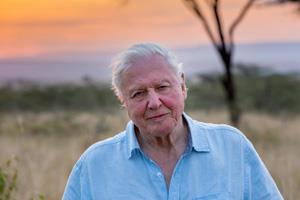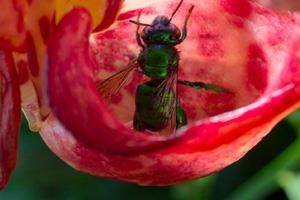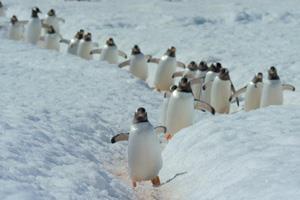Politics is inescapable these days, it seems. Take something as seemingly benign and simple — and beautiful to behold — as Our Planet, the new, expansive nature series from Netflix, narrated by the iconic David Attenborough (below). Much was made at the time of Netflix’s announcement that Attenborough was leaving BBC after a career spanning decades, a period in which he raised BBC’s world profile, all the while serving as a passionate spokesman for nature in all its glory, with generation-defining programs like Life on Earth, Blue Planet, Planet Earth and, most recently, Dynasties.

Netflix’s Our Planet was to be similar and yet different, and as viewers are about to learn Friday, it has largely succeeded. There are moments of eye-filling majesty and grandeur, backed by the swelling symphonic music of film composer Steven Price (Alfonso Cuarón’s Oscar-winning Gravity, BBC’s The Hunt). The familiar visual paean to nature and the natural world that made Planet Earth and Blue Planet must-see viewing in countless households around the world is there for all to see, and on a Netflix budget that puts most nature programs to shame. This time, though, there’s a noticeable, definitive shift in tone — more environmentally aware, less basking in the warm glow of nature for nature’s sake. There’s a sadness, a feeling of regret tinged with worry for an uncertain future, as we’re reminded, time and time again, that polar bears and elephants might not be with us for much longer.
Our Planet opens with a close-up, outer space view — 2001: A Space Odyssey-like — of the moon with the Earth rising gradually behind it. Since Neil Armstrong famously made his first step for man and giant leap for mankind, Attenborough tells us, the human population has doubled, while wildlife numbers have fallen some 60 percent during the same time period.
Our Planet isn’t strident. It doesn’t harangue the viewer with a lecture from the bully pulpit, though there are certainly those eco-crusaders in the environmental movement who want to shake all of us, every living person, out of our complacency.
Attenborough has not left BBC for Netflix, as some media reports have suggested. He may be 92 (he turns 93 next month), but he's committed to several more big projects for BBC including Frozen Planet II, Blue Planet III, and Planet Earth III.

Similarly, he has left the door open at Netflix; he was signed after-the-fact to narrate Our Planet as a one-off, to give the expensive program — even by Netflix standards — instant gravitas and global credibility. As has been pointed out elsewhere, the current TV landscape is such that Netflix can reach more viewers in a week than BBC can in an entire season. That instant access to the global community is one reason Attenborough needed no convincing, regardless of how it may have looked to his lifetime employer. In his later years, he has readily admitted to anyone who’ll listen that his main mission in life now is to convince as many people as he can, while he can, that the planet is in trouble and needs our help. Netflix’s reach doesn’t exceed its grasp: Our Planet could conceivably reach one billion people in ways BBC can’t, even if it truly wants to change the world.
Attenborough is the face and voice behind Our Planet but not its primary inspiration and prime reason for being. That would be veteran British producer Alastair Fothergill, who made Blue Planet and Planet Earth for BBC and has recently divided his time between BBC, Disney’s Disneynature film division (African Cats, Chimpanzee, and the soon-to-be-released Penguins, in theaters April 17) and now Netflix.
Fothergill, a Fellow of the British Royal Television Society and recipient of the Royal Geographical Society’s Cherry Kearton Medal, has been at the vanguard of socially conscious, environmentally aware nature filmmaking that seeks to be both entertaining and informative. Unlike Blue Planet, which touched only briefly on plastic’s effect on the world’s oceans, Our Planet’s entire focus is on the man-made threat to the natural world.
Interestingly, Our Planet comes on the heels of BBC’s Dynasties, which changed what viewers had come to expect from big, eye-filling nature programs, by following individual families of animals over a two- to four-year period, focusing on a single group of animals in each episode, rather than jumping back and forth from one part of the world to the other, as pioneered in those early, formative programs Frozen Planet and Planet Earth.

Our Planet is more in the Planet Earth style of storytelling than Dynasties, and early reviews in the UK — in the Daily Telegraph and Independent, for example — have grumbled that beautiful as Our Planet is to watch, the overall effect is scattered and unfocused as a result. Fothergill would argue that, unlike Dynasties with its Shakespearean tales of kings and matriarchs facing rebellion and revenge from within, Our Planet is unified by a single, overpowering message: that everything is connected, that what affects polar bears in Canada’s frozen north also effects elephants in Africa’s sun-scorched south, and the myriad microorganisms, smaller animals, and pollinating insects that lie between.
“From every region of the world there are stories that reveal nature’s resilience and show how restoration is possible,” Attenborough says in his voiceover, and it’s a reminder once again how, over time, his soothing, reverential tones have a calming effect on this crazy world we live in. There’s something truly joyful — and joyous — in the way Attenborough approaches his descriptive, narrative voice-overs, and I suspect that’s one of the main reasons why Blue Planet and Planet Earth have reached such a wide audience. He’s a born storyteller, and it’s not hard to imagine that, even with their drop-dead gorgeous visuals, programs like Blue Planet and now Our Earth wouldn’t reach nearly as many people without Attenborough as their guide and shepherd.
Our Planet is important because, while it doesn’t harangue and harass the viewer at home the way a stern lecture would, it focuses on the most important threat to humanity — arguably the most important story of our generation — in ways that both move and inspire. It’s not a headline grabber, but it is well worth seeing.